eric.ed.gov har udgivet: Many jurisdictions use data about college and career readiness to help stakeholders understand whether students are on track to succeed in college and careers after high school graduation. For example, Hawaii includes the percentage of high school graduates from a particular school who later attend college in school-level feedback reports for principals and other stakeholders. In American Samoa and the Commonwealth of the Northern Mariana Islands, education stakeholders have identified high school graduates’ college and career readiness as a key concern. Although both jurisdictions are taking steps to improve their data systems, it is unclear what data are available that can be used to determine students’ college and career readiness. This study cataloged the availability of college and career readiness data in both jurisdictions, described the functionality… Continue Reading →
Like this:
Like Loading...
tandfonline.com har udgivet en rapport under søgningen “Teacher Education Mathematics”: ABSTRACT ABSTRACT The second half of the 19th century saw a shift in the professionalisation of German language teachers. This general tendency was visible in the northern German merchant cities as well. There, ‘national’ (i.e. native speaker) teachers were replaced by modern foreign language experts trained at Prussian universities. Between the autodidacts and the fully trained academics, there was a generation of English teachers who were exceptional in quite a few respects. They were multilinguals who, based on their oral competencies, were able to hold their lessons in the target language; this pre-reform ‘direct method’ forms an exception in the grammar-translation dominated German language education of the 19th century. Rather than drawing their teaching methodology from neo-humanist sources, they adapted… Continue Reading →
Like this:
Like Loading...
tandfonline.com har udgivet en rapport under søgningen “Teacher Education Mathematics”: ABSTRACT ABSTRACT The Northern Finland Birth Cohort 1986 is a large population-based birth cohort, which aims to promote health and wellbeing of the population. In this paper, we systematically review the psychiatric research performed in the cohort until today, i.e. at the age of 32 years of the cohort (2018). We conducted a systematic literature search using the databases of PubMed and Scopus and complemented it with a manual search. We found a total of 94 articles, which were classified as examining ADHD, emotional and behavioural problems, psychosis risk or other studies relating to psychiatric subjects. The articles are mainly based on two large comprehensive follow-up studies of the cohort and several substudies. The studies have often used also nationwide register… Continue Reading →
Like this:
Like Loading...
tandfonline.com har udgivet en rapport under søgningen “Teacher Education Mathematics”: ABSTRACT ABSTRACT The Netherlands are quite unique in that the Dutch have always learned various foreign languages. Until 1940, French was the most important foreign language. Between roughly 1870 and 1970, Dutch learners in grammar schools and higher secondary schools were even obliged to learn three foreign languages: French, German and English. Since 1970, however, English has become the first foreign language, and proficiency in French and German has declined. As for methodology, Dutch foreign language teaching/learning (FLT) has always taken a practical stand, in which the question ‘does it work?’ is paramount. This article provides an overview of the developments that have characterised Dutch FLT from approximately 1500 to the present day. Link til kilde
Like this:
Like Loading...


